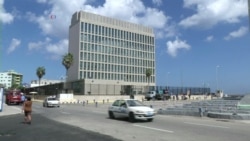The reestablishment of relations between Washington and Havana comes as Cuba is still struggling to recover from an economic crisis that began in the 1990s with the collapse of its patron, the Soviet Union.
But supporters of the Castro regime reject the assertion that Cuban communism is weak.
"Perhaps some dreamers or others, who are superficial, think this will be the end of socialism, and think that with the demise of the historic generation, socialism in Cuba is over,” 78-year-old Eladio Aguiar who fought against the CIA-led invasion of the Bay of Pigs in 1961 told Reuters Television. “But It's not like that.”
Cuban spin
As Secretary of State John Kerry raises raising the American flag over the U.S. Embassy in Havana and meets with a small group of dissidents afterwards, the Cuban government is selling the agreement to reestablish relations as a victory. Many Cubans are buying it, dissident artist Tania Bruguera said in a phone interview with VOA.
“You walk the street and talk to taxi drivers or people waiting in line and they say: ‘Cuba is setting the terms here and the U.S. is giving in to all its demands.’”
Bruguera, who was arrested last year when she tried to engage in public performance art in Havana, says the U.S. should now use its position to demand human rights reforms and help democracy take root.
That’s just a matter of time, says another dissident artist, Pedro Pablo Oliva, whose work has been compared to Picasso’s Guernica.
“You have to start somewhere, and I believe this is a good start,” he told VOA.
Skepticism
Supporters of the revolution remain suspicious of U.S. motives. Poet Nancy Morejon notes that President Barack Obama himself has said he hopes engagement will accomplish what half a century of isolation failed to do.
“That’s the agenda of the government of the United States,” she said. “But the Cold War is over and now we are all going to work with the best intentions to establish ties in a civilized way.”





